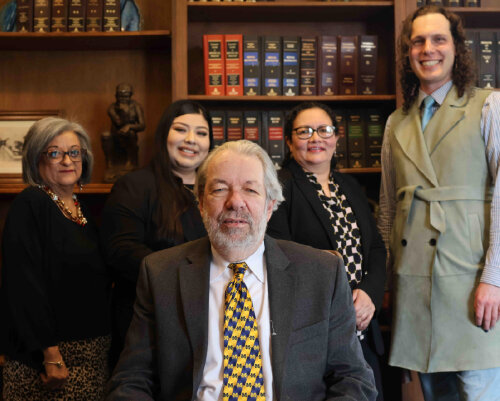Best Lawyers in United States
Share your needs with us, get contacted by law firms.
Free. Takes 2 min.
Or refine your search by selecting a city:
List of the best lawyers in United States
United States Legal Questions answered by Lawyers
Browse our 33 legal questions in United States and read the lawyer answers, or ask your own questions for free.
- Joint property ownership
- My wife and I deeded some property to our son and daughter. Our son and daughter has since passed away. Since he had no will or right of survivorships, what happens with his share of the property? If it goes through probate how long could that take?
-
Lawyer answer by Ascendance International Consulting (A-I-C)
Thank you for your inquiry. Based on the situation you’ve described, it seems that you transferred property to your son and daughter, but with your son’s passing and the lack of a will or right of survivorship, there are a...
Read full answer - Joint property ownership
- My wife and I deeded some property to our son and daughter. Our son and daughter has since passed away. Since he had no will or right of survivorships, what happens with his share of the property? If it goes through probate how long could that take?
-
Lawyer answer by Ascendance International Consulting (A-I-C)
Thank you for your inquiry. Based on the situation you have described, it seems that you transferred property to your son and daughter, but with your son's passing and the lack of a will or right of survivorship, there are...
Read full answer - Joint property ownership
- My wife and I deeded some property to our son and daughter. Our son and daughter has since passed away. Since he had no will or right of survivorships, what happens with his share of the property? If it goes through probate how long could that take?
-
Lawyer answer by Ascendance International Consulting (A-I-C)
Thank you for your inquiry. Based on the situation you’ve described, it seems that you transferred property to your son and daughter, but with your son’s passing and the lack of a will or right of survivorship, there are a...
Read full answer
United States Legal Articles
Browse our 33 legal articles in United States written by expert lawyers.
- New York Climate Superfund Act Liability 2026 Guide
- This new US climate cost recovery law is retroactive and targets large historical greenhouse gas (GHG) emitters in energy, industrial, and logistics sectors as "responsible parties" for a $75 billion fund. Liability is strict: the government does not need to prove fault, negligence, or causation of specific climate harms, only... Read more →
- NY 2026 Corp Tax: Thresholds & Franchise
- For tax years beginning on or after January 1, 2026, New York businesses will only be required to make estimated tax payments if their expected New York tax (including any MTA surcharge) is at least $5,000, up from $1,000. Many small and some mid-sized New York corporations and S corporations... Read more →
- Are Non-Competes Enforceable in New York?
- Non-competes are still legal in New York and most of the United States, but courts apply strict scrutiny and often refuse to enforce broad, form agreements. Governor Hochul vetoed New York's broad non-compete ban (often referenced as S4641A / S3100A) in December 2023, so as of my last update there... Read more →
About Hiring a Lawyer in United States
Hiring a lawyer in the United States involves a series of steps designed to ensure you receive competent legal assistance. Initially, you should identify the type of lawyer you need based on your legal issue, such as a criminal defense lawyer, family lawyer, or personal injury attorney. Start by researching and compiling a list of potential lawyers. Consider their expertise, experience, and client reviews. Once you've narrowed your list, arrange consultations to discuss your case and gauge their compatibility with your needs. During consultations, inquire about their approach, fee structure, and expected outcomes. Finally, select a lawyer who not only understands your case but makes you feel confident in their ability to represent you effectively.
Why You May Need a Lawyer
There are numerous situations where legal help may be necessary in the United States. These include facing criminal charges, where a defense attorney is critical, or dealing with divorce or child custody issues, which require a family lawyer. Personal injury claims after an accident, employment disputes, or breaches of contract often necessitate the expertise of an attorney. Additionally, navigating the complexities of real estate transactions, writing a will, or handling complex tax issues can benefit from professional legal counsel. Even in scenarios that seem straightforward, a lawyer ensures your rights are protected and that all procedures are followed correctly.
Local Laws Overview
The United States legal system is governed by both federal and state laws. It’s important to understand the jurisdiction relevant to your case as it affects the applicable laws and procedures. For example, criminal law, family law, and contracts are primarily governed by state statutes, thus varying widely across the country. Federal laws apply nationwide and cover areas like immigration, bankruptcy, and constitutional matters. Additionally, certain areas like consumer protection may have both federal and state regulations, requiring comprehensive legal knowledge. Lawyers practicing in the United States must pass the bar examination in the state they wish to practice to ensure they understand and can operate within these legal frameworks.
Frequently Asked Questions
How do I find a good lawyer?
You can start by asking for referrals from friends or family, researching online, or using local bar association resources to find qualified lawyers in your area.
What should I ask during a consultation?
Inquire about the lawyer’s experience with cases similar to yours, their proposed strategy, fees, and how they will communicate with you throughout the process.
What does "attorney-client privilege" mean?
This is a legal principle that ensures communications between you and your lawyer are confidential and cannot be disclosed without your consent.
How are legal fees determined?
Legal fees may be hourly, flat rate, or contingency-based, depending on the case type and the lawyer’s billing practices. Make sure to discuss this during your initial meeting.
Can I represent myself in court?
While you can represent yourself, known as "pro se" representation, it's often advised to hire a lawyer, as legal proceedings can be complex.
What should I do if I can't afford a lawyer?
Look into legal aid services or pro bono lawyers provided by various non-profit organizations and government-funded programs for assistance.
How long will my case take?
This depends on the case complexity, court schedules, and whether the case is settled out of court or goes to trial. Your lawyer can provide an estimated timeline.
What is a retainer fee?
A retainer fee is an upfront cost paid to hire a lawyer, who will then deduct costs from it as they work on your case.
Can I change my lawyer if I'm not satisfied?
Yes, you have the right to change your lawyer if you're not satisfied, though it can have implications depending on the stage of your case.
What should I do if my lawyer is unresponsive?
Attempt to contact them in writing, outlining your concerns. If there's no improvement, consider finding a new lawyer and notifying the bar association if necessary.
Additional Resources
For further information and assistance, consider reaching out to the American Bar Association, your state's bar association, or legal aid organizations in your area. Government websites, such as the U.S. Department of Justice or local court websites, also offer valuable resources and guidance on legal processes and rights.
Next Steps
If you need legal assistance, begin by identifying your specific legal issue and researching potential lawyers in that area of law. Gather all relevant documents and details about your case to share during consultations. Scheduled consultations will help you choose the right lawyer who meets your needs and budget. Remember, the key to a strong attorney-client relationship is open communication and mutual understanding, so be clear about your expectations and actively engage in the process.
Lawzana helps you find the best lawyers and law firms in United States through a curated and pre-screened list of qualified legal professionals. Our platform offers rankings and detailed profiles of attorneys and law firms, allowing you to compare based on practice areas, experience, and client feedback.
Each profile includes a description of the firm's areas of practice, client reviews, team members and partners, year of establishment, spoken languages, office locations, contact information, social media presence, and any published articles or resources. Most firms on our platform speak English and are experienced in both local and international legal matters.
Get a quote from top-rated law firms in United States — quickly, securely, and without unnecessary hassle.
Disclaimer:
The information provided on this page is for general informational purposes only and does not constitute legal advice. While we strive to ensure the accuracy and relevance of the content, legal information may change over time, and interpretations of the law can vary. You should always consult with a qualified legal professional for advice specific to your situation.
We disclaim all liability for actions taken or not taken based on the content of this page. If you believe any information is incorrect or outdated, please contact us, and we will review and update it where appropriate.
Refine your search by selecting a practice area.
Accidents & Injuries
Banking & Finance
Bankruptcy & Debt
Business
Civil & Human Rights
Consumer Rights
Corporate & Commercial
Criminal Defense
Employment & Labor
Energy, Environment & ESG
Family
Immigration
Insurance
Intellectual Property
Lawsuits & Disputes
Media, Technology and Telecoms
Notary Services
Private Client
Real Estate
Browse law firms by state in United States
Refine your search by selecting a state.


































